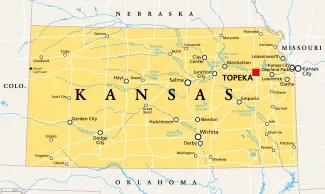
Four states file lawsuit to avoid losing U.S. House seats in 2030
Attorneys general from Kansas and three other states filed a lawsuit alleging the method of counting population for allocation of U.S. House seats unfairly benefitted states with concentrations of people in the country without permission.
Kansas Attorney General Kris Kobach was joined by attorneys general from West Virginia, Ohio and Louisiana in filing suit against the soon-to-depart administration of President Joe Biden. According to the lawsuit, the U.S. Census Bureau’s rule on population counts unlawfully required inclusion of people in the country illegally or holding temporary visas when apportioning seats in the U.S. House and the Electoral College.
The objective of the lawsuit filed in U.S. District Court in Louisiana was to stop the Census Bureau from continuing the policy when reapportioning the 435 congressional districts in 2030 and distributing Electoral College votes in the 2032 presidential election.

© PeterHermesFurian - iStock-1352430281
“Because the federal government has been counting illegal aliens in the Census,” Kobach said, “California has many more congressional seats and electoral votes than it should. This lawsuit will restore the Founding Fathers’ original vision of the United States.”
The lawsuit could meet opposition, given the U.S. Constitution empowered Congress with final authority over the Census. Traditionally, the federal government’s once-a-decade count sought to document the “whole number of persons in each state.”
In 2022, Pew Research estimated 56 percent of the nation’s 11.7 million people without legal residence lived in California, Texas, Florida, New York, New Jersey and Illinois.
Kobach said Ohio and West Virginia lost a congressional seat in wake of the 2020 Census to states with higher numbers of people in the country illegally. In a statement, the Kansas attorney general said it was possible Kansas and Louisiana could lose congressional seats and electoral votes in the 2030 Census if the “unlawful residence rule” was retained.

“We shouldn’t lose representation in Congress … due to the presence of illegal aliens harbored by other states,” said Louisiana Attorney General Liz Murrill. “Counting illegal aliens in the Census to determine congressional seats and electoral votes is unlawful. We have sued to stop it.”
Overall, the 2020 reshuffling of congressional districts took one seat from Ohio, West Virginia, California, Illinois, Michigan, Pennsylvania and New York. At the same time, the states of Colorado, Florida, North Carolina, Montana and Oregon each gained one seat, while Texas gained two seats.
The lawsuit said the four plaintiff states were or could be robbed of political power that was transferred to states with higher numbers of people with temporary visas or living in the country without proper documents. This system violated the 14th Amendment to the U.S. Constitution in regards to equal representation, the suit said.
The federal residency rule also conflicted with Article II of the constitution through redistribution of electoral college votes among states, the suit said.
The court filing asserted the phrase “persons in each state” was understood during the nation’s founding years and during the post-Civil War reconstruction era “to be restricted to United States citizens and permanent resident aliens who had been lawfully admitted” into the country. For example, the lawsuit said, it had been understood foreign diplomats temporarily residing in the United States weren’t to be counted.
“It is a national embarrassment that the most powerful country in the world does not know how many citizens it has and has not known for decades,” Kobach said.
The four-state legal effort was an incarnation of President Donald Trump’s effort in 2020 to exclude from the population count all people without documents allowing legal permanent residence in the United States.
Trump’s issuance of a memorandum outlining the population-counting strategy triggered a legal scuffle with the American Civil Liberties Union, Common Cause and other organizations. These groups argued the president’s memo violated administrative law because it hadn’t gone through the rulemaking process.
Kansas Reflector is part of States Newsroom, a nonprofit news network supported by grants and a coalition of donors as a 501c(3) public charity. Kansas Reflector maintains editorial independence. Contact Editor Sherman Smith for questions: info@kansasreflector.com.
















